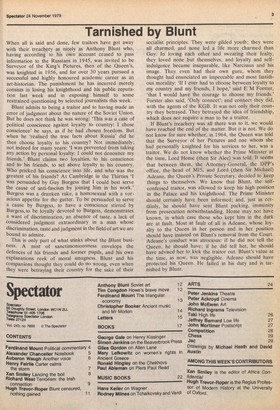Tarnished by Blunt
When all is said and done, few traitors have got away with their treachery as nicely• as Anthony Blunt who, having according to his own account ceased to pass Information to the Russians in 1945, was invited to be Surveyor of the King's Pictures, then of the Queen's, was knighted in 1956, and for over 30 years pursued a successful and highly honoured academic career as an art-historian. The punishment he has incurred merely consists in losing his knighthood and his public reputation last week and in exposing himself to some restrained questioning by selected journalists this week.
Blunt admits to being a traitor and to having made an error of judgment about the nature of the Soviet Union. But he does not think he was wrong: 'This was a case of political conscience against loyalty to country: I chose conscience' he says, as if he had chosen freedom. But when he 'realised the true facts about Russia' did he then choose loyalty to his country? Not immediately; not indeed for many years: was prevented from taking any action by personal loyalty: I could not denounce my friends.' Blunt claims two loyalties, to his conscience and to his friends, to set above loyalty to his country. Who pricked his conscience into life, and who was the greatest of his friends? At Cambridge in the Thirties 'I was persuaded by Guy Burgess that I could best serve the cause of -anti-fascism by joining him in his work.' Burgess was a drunken rake, a homosexual with a voracious appetite for the gutter. To be persuaded to serve a cause by Burgess, to have a conscience stirred by Burgess,to be loyally devoted to Burgess, demonstrates a want of discrimination, an absence of taste, a lack of considered judgment extraordinary in a man whose discrimination, taste and judgment in the field of art we are bound to admire.
This is only part of what stinks about the Blunt business. A mist of sanctimoniousness envelops the defences of his friends and former pupils, and his own explanations reek of moral smugness. Blunt and his Companions thought they could do no wrong, even when they were betraying their country for the sake of their socialist principles. They were gilded youth; they were all charmed, and none led a life more charmed than Guy. In loving each other and swearing their fealty, they loved none but themselves, and loyalty and selfindulgence became inseparable, like Narcissus and his image. They even had their own guru, whom they thought had enunciated an impeccable and most fastidious morality: 'If I ever had to choose between loyalty to my country and my friends, I hope,' said E M Forster, 'that I would have the courage to choose my friends.' Forster also said, 'Only connect': and connect they did, with the agents of the KGB. It was not only their country they betrayed. They betrayed the idea of friendship, which does not require a man to be a traitor.
If Blunt's treachery was all there was to it, we would have reached the end of the matter. But it is not. We do not know for sure whether, in 1964, the Queen was told that the Surveyor of her Pictures and one whom she had personally knighted for his services to her, was a traitor. We do not know whether the Prime Minister at the time, Lord Home (then Sir Alec) was told. It seems that between them, the Attorney-General, the DPP's office, the head of MI5, and Lord (then Sir Michael) Adeane, the Queen's Private Secretary, decided to keep things to themselves. We know that Blunt, the selfconfessed traitor, was allowed to keep his high position in the Palace and his knighthood. The Prime Minister should certainly have been informed; and, just as certainly, he should have sent Blunt packing, immunity from prosecution notwithstanding. Home may not have known, in which case those who kept him in the dark are at fault. Most at fault of all is Adeane, whose loyalty to the Queen in her person and in her position should have insisted on Blunt's removal from the Court. Adeane's conduct was atrocious: if he did not tell the Queen, he should have; if he did tell her, he should have advised her to kick the traitor out. Blunt's value at the time, as now, was negligible. Adeane should have protected his Queen. He failed in his duty and is tarnished by Blunt.


































 Previous page
Previous page